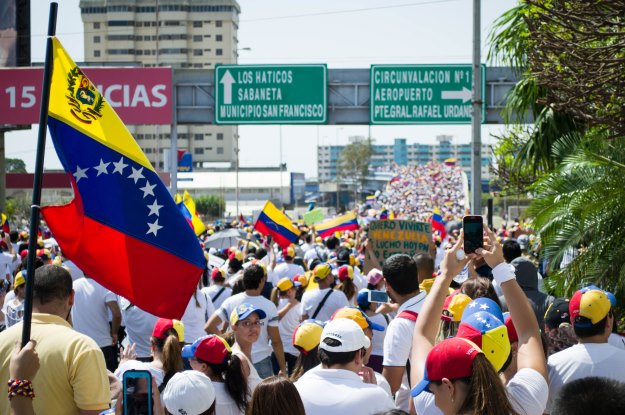September 1 may mark a “before and after” moment in Venezuela’s political and economic crisis.
Following further delays by the electoral authority on advancing a recall referendum against President Nicolás Maduro, opposition leaders have called on residents across the country to mobilize in the capital city this Thursday in what they have dubbed “The Grand Taking of Caracas.”
The opposition is anticipating success, and expects at least one million people to join the march. Henrique Capriles of the Primero Justicia party said the protest will have a worldwide impact.
But will it?
The opposition has been optimistic about its chances before, yet despite previous demonstrations and apparent turning points in public opinion against his rule, Maduro has been able to maintain a hold on power.
But there is something unique about September 1, according to Francisco Toro, the editor-in-chief of Caracas Chronicles, an English-language news site.
“There really hasn’t been a unified call to protest from all of MUD (the opposition coalition) in the Maduro era – ever,” Toro told AQ. “Really, this is the first time.”
The opposition’s aim is to pressure the National Electoral Council (CNE) to proceed with the recall process before January 10, after which Maduro’s removal would leave his vice president in charge for the remainder of his term. At the very least, opposition lawmakers say, they hope for a set date for the process to continue.
The challenge, political analyst and pollster Félix Seijas told AQ, is that to be effective the protests need to be both large and sustained. “They need to concentrate at least 1 percent of the population, that is 300,000 people, and keep people in the streets after Thursday across the country in a coordinated way,” he said.
Whether or not people continue to protest in the weeks and months ahead will depend on the success of the September 1 demonstrations and whether the government responds with violence, Seijas added.
The government seems to have the same idea. In what appeared to be preparation for the protests, Venezuelan military guards began blocking access to Caracas last week. Some government officials are energetically voicing threats against demonstrators. “I have a surprise for you on the day of the march,” Maduro said last week, “…we have lots of space in jail for fascists.”
Although some worry that the military has strong incentives to repress the demonstrators, other analysts believe the armed forces will hold back, given the current level of international attention on Venezuela. “They’re evaluating their response carefully because of Maduro’s national and international rejection,” Álex Vásquez, a Venezuelan political journalist, told AQ. “I think the government is scared.”
In the past week, the government has prohibited private jets and drones from flying in its airspace, transferred former mayor and influential opposition figure Daniel Ceballos, who was under house arrest, back to prison, and had 4,000 public employees who signed a petition in support of the referendum removed from their posts. The vice president also called for the mobilization of government supporters in the center of Caracas on the same day as the opposition march.
Adding to the list of forces acting against the protest is the belief that demonstrations may not change anything. Oraangel Saavedra and Dina Ravelo, both residents of the Caracas slum of Catia, said that although they will march, they don’t expect anything new. “Everyone is going. But deep down we know that it will be like any other march,” Ravelo told AQ.
Seijas echoed that sentiment. “Experience in the last 15 years has been that marches haven’t led to results.” But still, given the levels of discontent among the population, Seijas said he expects turn out to be substantial.
The opposition is counting on it, and according to Toro, Thursday is only the beginning. “They are preparing politically to try to turn this into the launch of a season of protests, not a one-off.”
That still may not be enough to pressure the CNE to action. The body has a vested interest in delaying the recall process at least until next year. But Vásquez, for one, doubts that it will ignore mass marches. “They will at least set a specific date to ease the tensions,” he said, even if that date isn’t until late October, as the head of the CNE recently suggested.
Seijas agreed that the status quo could prevail “unless the protests are massive and sustained.” It all depends on what happens on September 1.
—
Krygier is a writer from Venezuela and editorial intern for Americas Quarterly.








